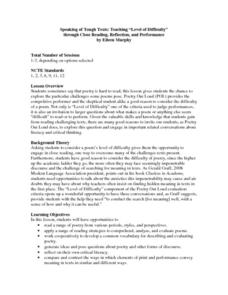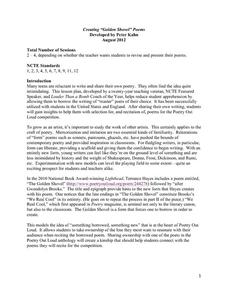BBC
Recognizing Formal and Informal Language
When do you need to use formal language, and when is it cool to speak informally? Read these sentences and use a grid to help decide. This clever tool is followed by ten sample sentences to identify as formal or informal, perfect for...
Southern Nevada Regional Professional Development Program
“Double Double Speak Speak”
Bilateral suborbital hematoma? Call an audible? 404? Have fun with “the twittering or warbling of birds,” or as 14th century French speakers would say, have fun with “jargon.” Groups match specialized jargon with plain speech, decode...
Curated OER
Comma Practice Worksheet
Start by introducing your class to basic comma rules, and then give them this practice sheet. First, learners add commas where necessary, and then they write down which comma rule (or rules) used in each sentence. Great practice!
Curated OER
Mississippi Trial, 1955: A Request Strategy for Questioning
Knowledge, comprehension, application, analysis, synthesis, evaluation. Class members use Bloom's taxonomy to craft six levels of discussion questions for Chris Crowe's novel, Mississippi Trial, 1955. Model questions from Chapter 3, a...
Novelinks
The Westing Game: Anticipation Guide
Are all criminals bad people? Pupils answer this and other compelling questions in an anticipation guide for The Westing Game by Ellen Raskin. Designed for learners to complete before reading the text, the...
Teach Engineering
Working Together to Live Together
Whose home is it anyway? Design teams plan a housing development in which they must also protect a native species. The teams consist of a project manager, civil engineer, environmental engineer, and graphic designer. Teams present their...
Curated OER
Physical Education Unit Plan: Soccer - Lesson 2
Here is the 2nd of 10 lessons on soccer. These lessons not only focus on skills but also on some of the social issues regarding the sport. The skills lessons seem to be created around the premise that the youngsters already have some...
Curated OER
Sitting across from Each Other
What is the probability that two randomly seated people will be across from each other at a square table? Check learners' understanding of theoretical probability and compound events with this short assessment. A great opportunity to...
Curated OER
Minutes and Days
Elapsed time is a skill developed by the single question that is the center of this activity. Fifth graders are asked to find out the time that is 2011 minutes after the beginning of 2011. This question addresses the standard that...
Curated OER
Teaching “Level of Difficulty” through Close Reading, Reflection, and Performance
What makes a poem difficult? Explore that topic and more with your class as you work through the lesson detailed here. Using materials from Poetry Out Loud, a national recitation contest, individuals or small groups examine poems and...
Curated OER
Alex, Mel, and Chelsea Play a Game
This short probability question may look simple at first, but it is actually quite complex! Learners must understand independent events in context and must take into account several different scenarios. Use as an individual assignment...
Curated OER
Integer Solutions to Inequality
When is the last time you assigned your students only one problem? This seemly simple problem requires learners think like a mathematician and reason about how to solve this compound inequality in one variable. More than just using...
Curated OER
Unit Squares and Triangles
This is an interesting geometry problem. Given the figure, find the area of a triangle that is created by the intersecting lines. The solution requires one to use what he/she knows about coordinate geometry, as well as triangle and angle...
Illustrative Mathematics
Box of Clay
What happens to a volume when you scale the dimensions of a rectangular prism? For this problem, a box of clay is increased in each dimension, with the intent to see if learners can generalize the result. The addition of physical models...
Poetry Out Loud
Creating "Golden Shovel" Poems
Get even your most reluctant pupils reading, writing, reciting, and maybe even enjoying poetry! A four day lesson, young writers learn about Golden Shovel poems: a poem format that uses borrowed words from other poems as the last words...
Curated OER
T Points from Directions
Here is a instructional activity that starts with having geometers translate points using compass directions into an accurate picture of the problem. Then they must use their knowledge of the Pythagorean theorem or similar triangles to...
Illustrative Mathematics
Anna in D.C.
The amount of tax and tip on a restaurant bill is a common example used in percent problems. Here, learners only know the total amount paid, and they need to figure the itemized amounts. Solutions using a ratio table, using knowledge of...
Illustrative Mathematics
Seven to the What?!?
Sometimes what seems like the easiest problem is really the most difficult. Your class is first going to reach for their calculators, but will realize the number is too large to evaluate. Now what? This is where the fun and the logical...
Polar Trec
The Amazing Antarctic Trek
This resource provides two ways to engage learners in using latitude, longitude, and research skills. In pairs, or on their own, learners will locate several Antarctic regions on a map. They will write the name of the place and a few key...
Illustrative Mathematics
Sammy's Chipmunk and Squirrel Observations
Here is a fun project. Sammy observes a chipmunk and a squirrel to see how many holes each needs in order to stash the same number of acorns. Scholars could find the answer algebraically or create a table to analyze the problem in...
Illustrative Mathematics
Area of a Trapezoid
Here is a straightforward example of how to apply the Pythagorean Theorem to find an unknown side-length of a trapezoid. Commentary gives additional information on proving that the inside of the trapezoid is a rectangle, but is...
Illustrative Mathematics
Fruit Salad
Playing with values in this fruit salad problem allows learners to find out how many cherries were mixed in. Your middle schoolers can organize their thoughts in a chart before going into the equation. Eigth graders can skip the chart...
Illustrative Mathematics
Two-School Dance
Who's ready for the dance? When two middle schools combine for a dance, your learners' job is to calculate the ratio of girls attending. Provided with three different solutions, you can choose from setting up a ratio, linear equation, or...
Illustrative Mathematics
Offensive Linemen
Comparing college football teams, Division I is said to have heavier lineman than Division III. Your mathematicians are given data from two different divisions and will have to interpret a dotplot and calculate the difference in weight...
Other popular searches
- Perfect Competition
- Competition Predation
- Animal Competition
- Fair Competition
- Monopolistic Competition
- Species Competition
- Sports Competition
- Global Competition
- Profit and Competition
- Tongue Twister Competition
- Business Competition
- Cultural Competition

























